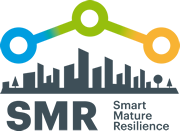The Smart Mature Resilience team from the University of Strathclyde was awarded "Best Paper" at the Group Decision and Negotiation conference in Stuttgart from 14-18 August 2017, a major international management science and group decision conference. The awarded paper was authored by Colin Eden, Igor Pyrko, and Susan Howick and is entitled ‘Knowledge Acquisition Using Group Support Systems’. The paper describes the work undertaken to gather data for the construction of the Risk Systemicity Quesionnaire (RSQ) as part of the SMR project, which involved a new approach for using a Group Support System for research.
The paper reports on the use of a Group Support System (GSS) to acquire vast knowledge from city participants in seven European cities with respect to the interactions between risk events faced by the cities. Data collection took part during three workshops conducted as part of the Smart Mature Resilience project funded by the H2020 programme, and it was concerned with topics related to critical infrastructure, social dynamics, and climate change. The aim of data collection was to inform the construction of a Risk Systemicity Questionnaire (RSQ) which is an interactive tool designed to support cities in improving their resilience.
A series of GSS workshops was organized in which participants co-created the risk scenarios that formed the main content of the tool. While GSS have been previously used successfully to improve the productivity of team meetings, its use for acquisition of vast knowledge is under-researched. This paper presents an approach to using a GSS to inform specific research questions rather than to develop new solutions which participants can take ownership of and implement immediately in their work. In turn, the use of GSS in such non-traditional context poses a number of important methodological considerations of which GSS facilitators should be aware.
Firstly, the GSS provides an advantage of acquiring vast knowledge efficiently and significantly quicker than gaining evidence from literature. It may be argued that evidence from literature provides more accurate data, however, the GSS data can be validated incrementally as the data is analysed and used. Secondly, when GSS is applied to acquire vast knowledge in a relatively short amount of time, unlike traditional uses of the GSS, there is a tension between speed and efficiency and building group ownership versus validation of the knowledge acquired. However, when busy experts are involved, efficient knowledge acquisition may be the only realistic approach for conducting the research. And thirdly, this paper presents an argument that experts’ collaboration and communication within a GSS-facilitated workshop can be a more effective way of preparation for future risks rather than exclusively relying on past events.
The full paper is available in the conference proceedings on the GDN website.
Image copyright: GDN best paper award (University of Strathclyde) by "Igor Pyrko", licensed under Copyright Igor Pyrko




